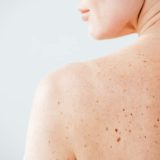

Since November is National Healthy Skin Month, now is a good time to think about the actions you can take to make your body’s largest organ as strong and as vibrant as it can be. Not sure what those actions should be? Take a look at 7 ways below:
1. Drink More Water
Studies have found that drinking more water daily can positively impact your skin in as little as two months. (1) Always keeping water by your side makes it easier to increase your intake. Take a few drinks every 30 minutes to an hour and consume a full glass at each meal. Your skin will thank you with each sip.
2. Watch Your Time in the Sun
While spending time in the sun is a great way to get some vitamin D, too much time in its powerful rays can be damaging to the skin. You’ve likely witnessed this yourself if you’ve ever spent the day at the beach only to have dry skin as a result. Not to mention, this can also raise your risk of skin cancer.
So, if you plan on spending a lot of time outdoors, wear a hat and other clothing designed to protect your skin. And don’t forget your sunblock!
3. Limit Your Hot Showers and Baths Too

Some people prefer using hot water in their morning showers. Or they like to unwind in a steamy bath at night. This may feel good initially, but it also dries your skin out.
One way to keep this from happening is to lower the water’s temperature by a few degrees. If the idea of a cooler shower or bath sounds completely unappealing, try limiting your time in the hotter water. While there, it can also be helpful to stick to moisturizing soaps versus using products designed to remove the natural oils from your skin.
4. Eat Fatty Fish
Fatty fish is high in omega-3 fatty acids. What’s good for skin? Omega-3 fatty acids.
Oregon State University reports that omega-3s can:
- help alleviate skin damage from the sun
- reduce signs of aging in the skin
- and even ease inflammation. (2)
Fish that are higher in this healthy fat include salmon, sardines, mackerel, and herring. Add them to your salad at lunch or make them the star of your dinner. Either option is good.
5. Kick the Cigarette Habit
Research has found that, when compared to non-smokers, smokers have less skin elasticity while also having thicker and more dense layers of skin. (3) This study further noted that smokers tend to also have reduced skin hydration, which can serve as a double-whammy.
Certainly, quitting smoking isn’t easy. If you want help, the Centers for Disease Control and Prevention (CDC) offers many resources for kicking your cigarette habit.
6. Control Your Stress
Stress can affect your health in a number of ways, from raising your blood pressure to making it hard to get a good night’s sleep. But did you know that it can also affect your skin’s health?
If you suffer from acne, you’ve likely already endured stress’s effects firsthand with flare-ups every time life throws you a bit of a curve ball. Find ways to handle stressful situations when they arise.
- Go for a walk
- do a few breathing exercises
- vent to a friend.

It doesn’t matter so much what you do, just that you do something to let go of all of the tension in your life before it has the opportunity to build up and take its toll.
7. Take Supplements Designed to Promote Skin Health
Just as taking a multivitamin can help fill the gaps in your diet to promote better physical and mental health, there are also a few supplements that can supply the nutrients needed for maximum skin health too.
For example, Natural Wellness’s Hair, Skin & Nails contains a variety of vitamins and minerals that support the production of the three proteins that contribute to healthy skin: collagen, elastin, and keratin. UltraThistle—which contains milk thistle—is another good option due to its ability to reduce skin inflammation. (4)
Conclusion
Your skin is the one organ that you see day in and day out. Make a commitment to look after its health during Healthy Skin Month. The changes you make during this month may just stick with you long-term, providing healthier skin for the entire year!




